

Oral Microbiome and Alzheimer's Disease. Leaky blood vessels may trigger Alzheimer's. Alzheimer's: What leads to brain cell damage?
Alzheimer's Disease--Early Signs. Alzheimer's Disease--Diagnostics. Mechanism of Alzheimer’s Onset Revealed. The brain’s ability to dispose of amyloid beta 42 decreases with age.
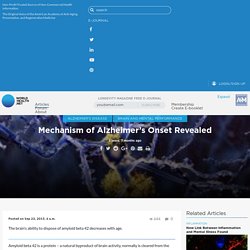
Amyloid beta 42 is a protein – a natural byproduct of brain activity, normally is cleared from the brain before it can clump together into plaques that are suspected to be a key contributor to Alzheimer’s disease. Randall J. Bateman, from Washington University School of Medicine (Missouri, USA), and colleagues assessed amyloid-beta kinetics in 112 men and women, ages 60 to 87 years, half of whom had clinical signs of Alzheimer's disease. Plaques had begun to form in the brains of 62 participants. Each subject received detailed mental and physical evaluations, including brain scans to check for the presence of plaques, and cerebrospinal fluid analysis to monitor the body's production and clearance of amyloid beta 42 and other proteins.
Understanding The Neuroscience Behind Alzheimer's Disease in 2 Minutes. In this video by Neuroscientifically Challenged, they explain the neuroscience behind Alzheimer’s, a progressive, neurodegenerative disease that causes memory loss, along with the degenerative loss of other mental functions as time proceeds.
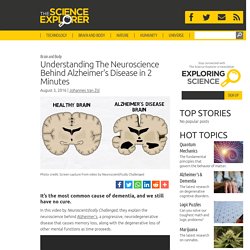
How an outsider bucked prevailing Alzheimer's theory, clawed for validation. Robert Moir was damned if he did and damned if he didn’t.
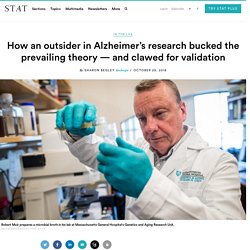
The Massachusetts General Hospital neurobiologist had applied for government funding for his Alzheimer’s disease research and received wildly disparate comments from the scientists tapped to assess his proposal’s merits. It was an “unorthodox hypothesis” that might “fill flagrant knowledge gaps,” wrote one reviewer, but another said the planned work might add little “to what is currently known.” A third complained that although Moir wanted to study whether microbes might be involved in causing Alzheimer’s, no one had proved that was the case. As if scientists are supposed to study only what’s already known, an exasperated Moir thought when he read the reviews two years ago.
He’d just had a paper published in a leading journal, providing strong data for his idea that beta-amyloid, a hallmark of Alzheimer’s disease, might be a response to microbes in the brain. But something had long bothered him about the “evil amyloid” dogma. Dr. Fungal Infections Involved in Alzheimer’s Disease? Amylin's Role in Obesity and Alzheimer's. Elderly patients that are cognitively impaired can have high levels of fasting amylin.
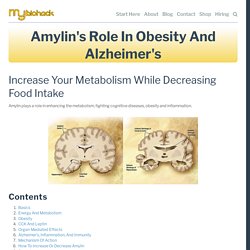
R Type II diabetes (T2D), Alzheimer’s disease (AD), Parkinson’s disease (PD), and Huntingdon’s disease (HD) are associated with protein and amyloid formations. R The primary components of amyloid and fibril-forming molecules are called hIAPP (amylin and insulin). Alzheimer's disease might be a 'whole body' problem. Alzheimer's Disease May be Triggered by Calcium Imbalance. A calcium imbalance within the brain cell may be the cause of Alzheimer's.
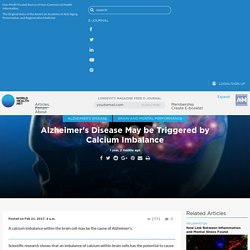
Scientific research shows that an imbalance of calcium within brain cells has the potential to cause Alzheimer's disease. It appears as though this imbalance catalyzes the neurodegenerative process. Of particular importance are the mitochondria within brain cells. Mitochondria, often called the "powerhouse of the cell" are tiny structures that turn energy derived from food into fuel for cells. Further Confirmation for 'Transmissible Alzheimer's' Theory. Researchers have reported a second case that suggests Alzheimer's can be transmitted during medical treatments.

Researchers have reported autopsy results, for the second time, that suggest that Alzheimer's disease may be transmitted to people during certain medical treatments. These latest autopsies were conducted on the brains of seven people who died from Creutzfeld Jakob Disease (CJD). Decades previously, these seven people all had a procedure that involved surgical grafts of dura mater — the membrane that covers the brain and spinal cord. This involved taking a section of the dura – the membrane surrounding the brain – from a person who had recently passed away.
These grafts were contaminated with the prion protein that causes CJD. How microbial infections might cause Alzheimer’s disease. On Friday afternoons, Robert Moir, a neurologist at Massachusetts General Hospital in Boston, indulges in what he calls his ‘play hour’.

He doesn’t go to the gym or head to the bar; he plops down in front of his computer – OK, yes, usually with a beer in hand – and directs his browser to PubMed, the US National Library of Medicine’s database of study abstracts from life-science journals. Then he hunts around for hidden gems: studies that might provide a fresh perspective or lead him down a new research path. On 11 May 2007, Moir stumbled across a set of studies while sipping a Sam Adams that would change the course of his career. Is Alzheimer's disease a disorder of energy metabolism? Date: October 26, 2017.
Alzheimer's disease found to be a diabetic disorder of the brain. Breakdown of brain cells' metabolic collaboration linked to Alzheimer's disease. Decreased glucose metabolism in medial prefrontal areas is associated with nutritional status in patients with prodromal and early Alzheimer's disease. New mechanism detected in Alzheimer's disease. New brain death pathway in Alzheimer's disease. Overactive scavenger cells may cause neurodegeneration in Alzheimer'suntitled. Protein involved in Alzheimer's disease may also be implicated in cognitive abilities.
Unraveling Alzheimer’s: New study documents how brain cells go bad. Brain's response to mid-life surge in cell aging starts or ends a path to dementia. Inflammation drives progression of Alzheimer's. New details on aged brain, Alzheimer's and dementia. New player in Alzheimer's disease pathogenesis identified. Alzheimer's disease: Dual mechanism of actions of overactive and cytosolic BRCA1 in neuronal death. Advances in brain imaging settle debate over spread of key protein in Alzheimer's.
Amyloid protein transmission through neurosurgery. Alzheimer’s Patients May Be Treated by Targeting Synaptic Proteins, Study Finds. Proteins in nerve cell synapses, which transmit signals between neurons, are abnormal in the brains of patients with Alzheimer’s disease and other dementias, Swedish researchers concluded after performing a large-scale analysis of synaptic proteins in patients’ brains.
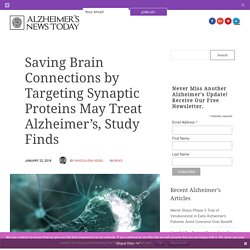
By studying these flaws, researchers could distinguish between Alzheimer’s patients and those with Parkinson’s disease dementia. A loss of synapses is tightly linked to cognitive decline in dementia. Therefore, the research team at Karolinska Institutet thinks that it may be possible to design treatments that prevent this loss by targeting the identified proteins — thereby preventing or slowing cognitive loss. Their study, “Synaptic markers of cognitive decline in neurodegenerative diseases: a proteomic approach,” appeared in the journal Brain. It included 32 patients who had died from Alzheimer’s, Parkinson’s disease with dementia, and dementia with Lewy bodies, as well as older adults without dementia.
Evolutionary Psychiatry: Alzheimer's and Hyperglycemia. The theory that Alzheimer's dementia is in part caused by metabolic syndrome is fairly well known in the paleoblogosphere and literature.
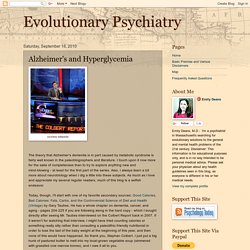
I touch upon it now more for the sake of completeness than to try to explore anything new and mind-blowing - at least for the first part of the series. Also, I always learn a bit more about neurobiology when I dig a little into these subjects. As much as I love and appreciate my several regular readers, much of this blog is a selfish endeavor. Today, though, I'll start with one of my favorite secondary sources: Good Calories, Bad Calories: Fats, Carbs, and the Controversial Science of Diet and Health (Vintage) by Gary Taubes.
Here's the theory. There's a protein called insulin-degrading enzyme that does just what you might expect. The obvious conclusion is that once wants low insulin levels so that your insulin-degrading enzyme can keep itself busy with the pesky amyloid, leaving none to form plaques. Evolutionary Psychiatry: Alzheimer's and Hyperglycemia 2. So we know what Gary Taubes thinks.
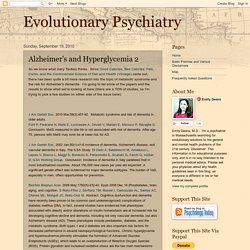
Since Good Calories, Bad Calories: Fats, Carbs, and the Controversial Science of Diet and Health (Vintage) came out, there has been quite a bit more research into the topic of metabolic syndrome and the risk for Alzheimer's dementia. I'm going to list some of the papers and the results to show what we're looking at here (there are a TON of studies, so I'm trying to pick a few studies on either side of the issue here): So what have we got?
Italians who seem to be protected from dementia by metabolic syndrome. Sigh. It's complicated. But the overall theory isn't as straightforward as Taubes insulin-degrading enzyme being too busy to clean up the amyloid too, though the overall theory is simple in concept - hyperglycemia speeds up aging. All in all, the primary sources certainly give one less of a warm and fuzzy feeling than the secondary ones. Evolutionary Psychiatry: Alzheimer's Pathology and the Dementia-Free Kitavans. Over the last twoposts I explored the theory that hyperglycemia might be one of the predisposing factors for developing Alzheimer's dementia. The epidemiological studies looked pretty solid (though we know that a strict reliance on epidemiology can cause us to do ridiculous things, such as eating boneless skinless chicken breasts or, even worse, veggie burgers). At least there was a plausible biochemical mechanism - high levels of insulin could interfere with the enzyme that clears away amyloid in the brain, thus allowing amyloid to build up into plaques.
Unfortunately, the smaller studies and autopsy studies Dr. Evolutionary Psychiatry: The Wild and Compelling Theory that Alzheimer's Dementia is Caused by Infectious Disease. As you recall, Alzheimer's Disease is a slowly progressive illness of neuronal degeneration. The cardinal symptoms are cognitive impairment and memory loss, but the condition eventually leads to death. I've dedicated many posts to Alzheimer's, which is a reflection of the amount of research out there. And for today's post, I'm going to begin with a nice review article from 2008, and over another post (or several) try to finish out with some more specific looks at the various papers. Even if you don't find Alzheimer's that compelling, if infectious agents contribute to its pathology, then you have to open your mind to the idea that many neurodegenerative processes could be due to (or accelerated by) infection.
Neurodegenerative diseases include many neurological illnesses, but also depression, bipolar disorder, schizophrenia, autism... Could Alzheimer's Dementia Be Caused by a Virus? The amyloid cascade hypothesis: are we poised for success or failure? - PubMed - NCBI. Energy storehouses in the brain may be source of Alzheimer's, targets of new therapy. Link between vascular disease and Alzheimer's strengthened. Half of all dementias start with damaged 'gatekeeper cells' Alzheimer's: Low serotonin levels may drive development.